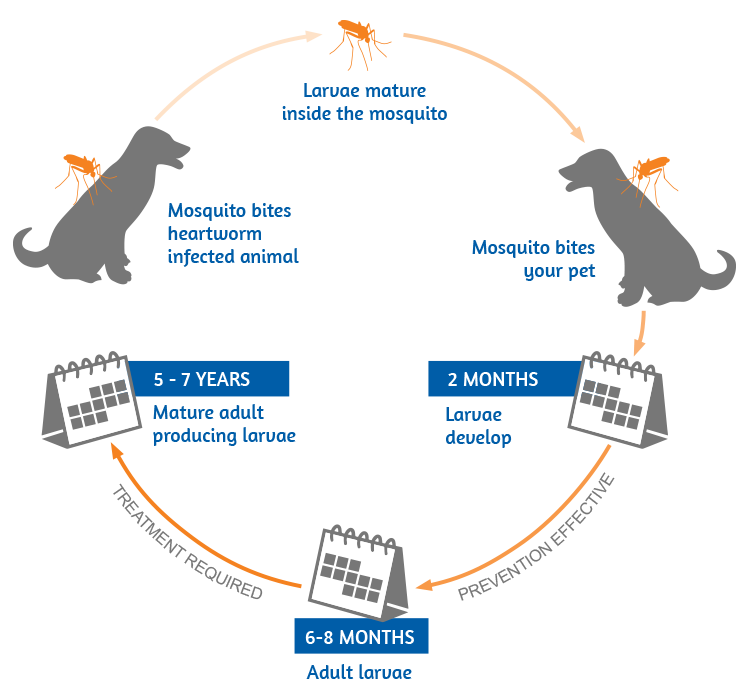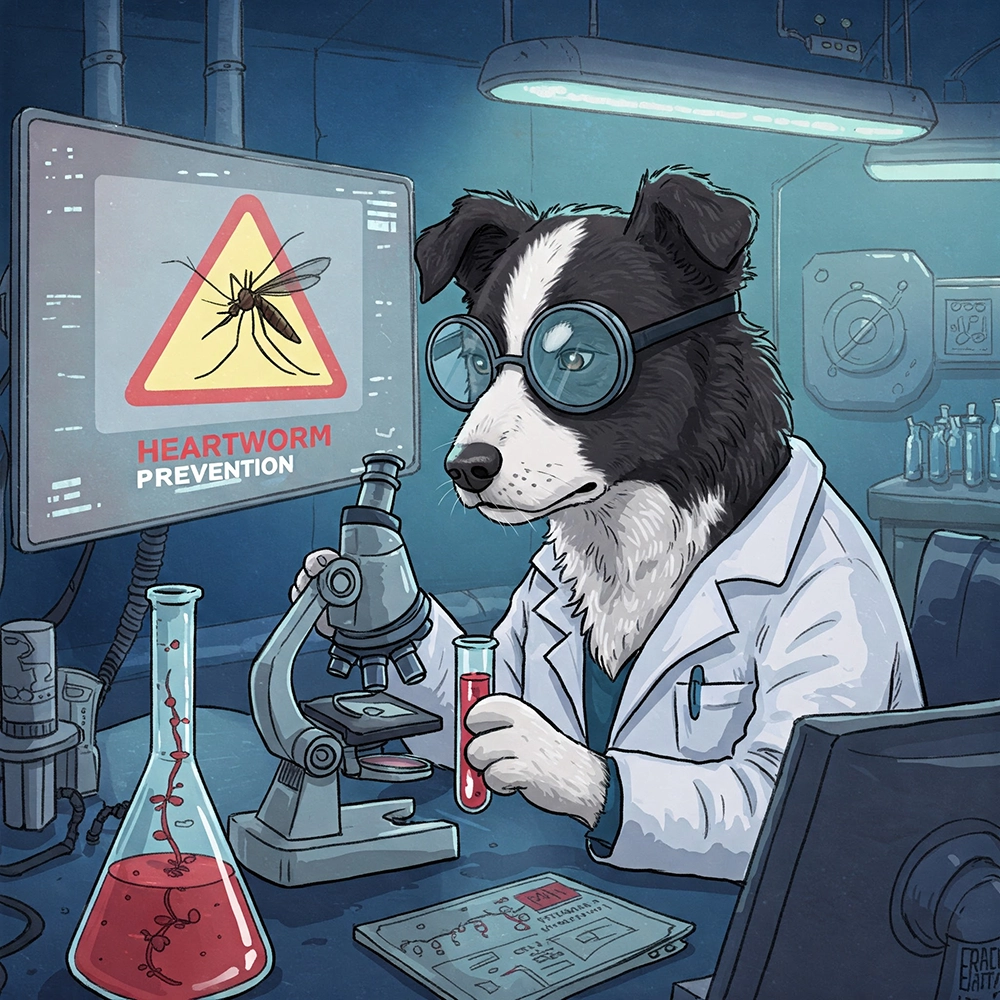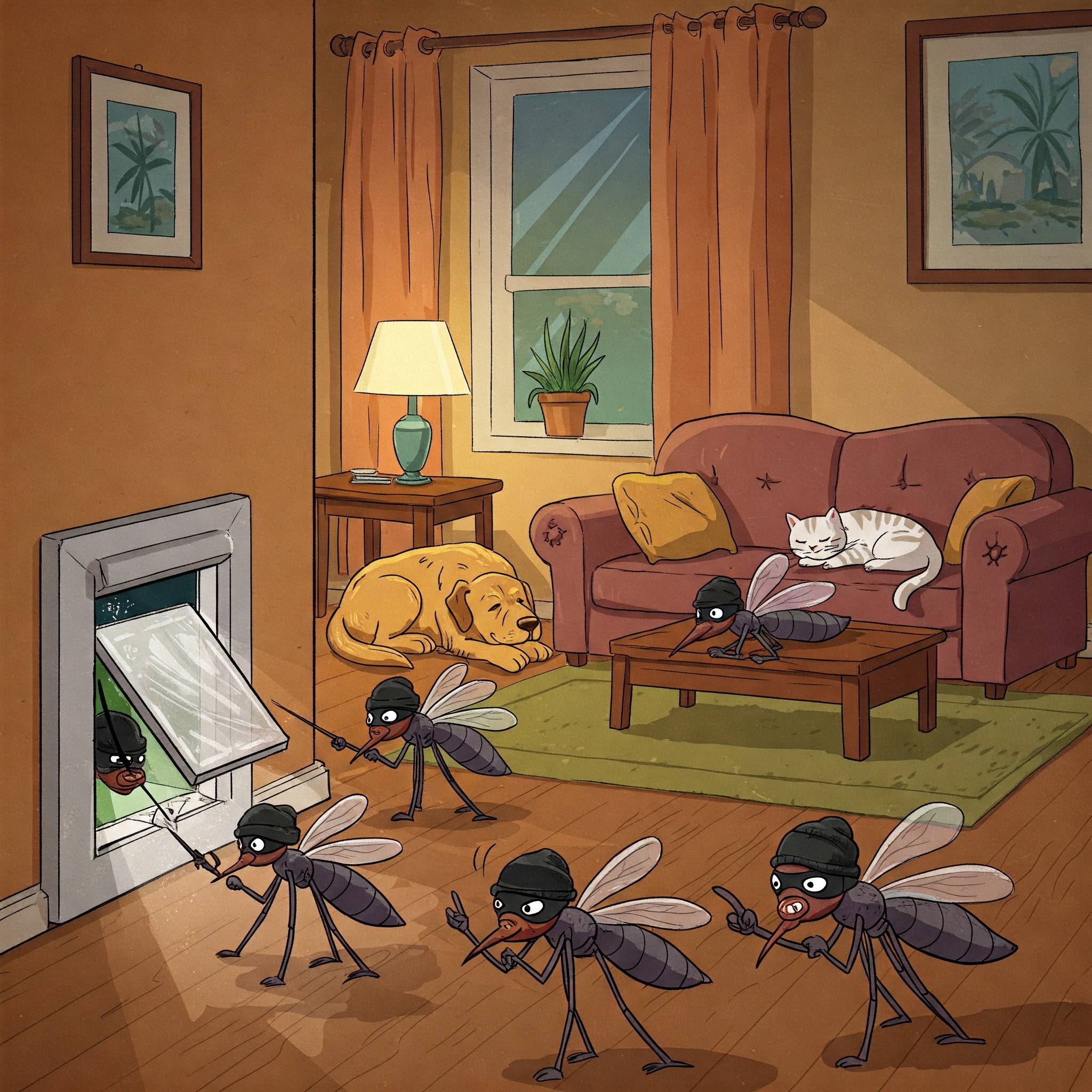Heartworm: Prevention is the Best Medicine
Heartworm disease is caused by a parasite called Dirofilaria immitis. It lives in the right side of the heart and the adjacent blood vessels. Its presence causes cardiovascular weakness, compromised lung capacity and eventual death. Heartworm disease occurs primarily in dogs but can occur on occasion, in cats and other mammals.
Heartworm is transmitted from dog to dog by mosquitoes. When a mosquito draws blood from a dog infected with heartworm, it takes with it a number of small immature worms called mircrofilariae. Once inside the mosquito, the microfilariae develop into larvae. Later when the mosquito bites a new victim, the larvae are injected and that dog becomes infected.
It takes 6 to 8 months for the larvae to develop into adult worms. The adults shed a protein that is picked up on the heartworm test. So, if the transmission season (the time of year when infective mosquitoes can bite) ends in October; it will take until late spring for a dog infected at the end of the season to test positive.

Dogs are tested before being put on preventative medication for the summer. The test is a simple blood test. With a negative result, your dog can begin heartworm medication for the season. These medications are given once per month from June to November each year. If you travel south during the winter months (i.e. Florida) with your canine companion, mosquitoes will be present. It is important to consider heartworm prevention before heading on your trip.
The treatment of heartworm disease itself is quite complicated and can have a number of very serious effects. Heartworm prevention is very safe and effective. There are many forms of heartworm preventative medications. Sixteen Mile Veterinary Clinic likely carries both chewable tablets and topical liquids. Talk to Dr Trisch or Dr Honda to determine which specific medication best suits you and your pet.

Other Articles

As tick populations continue to rise across Canada, pet owners are facing an increasing need to check their furry companions for these persistent pests. Ticks thrive in grassy, overgrown areas and can latch onto pets, searching for the perfect spot to feed. While their bites can be a nuisance, the bigger concern is the potential transmission of Lyme disease and other illnesses. This article explores how to identify, remove, and prevent ticks on your pets, along with the importance of regular testing and professional veterinary treatments to keep them safe.

Think you know what's in your pet's food? Think again! Many common pet food myths have been debunked, from the truth about "holistic" labels to the surprising benefits of by-products. Find out which pet food facts you can trust and which ones are just marketing fluff.

Scratching is a natural and necessary behavior for cats, but it doesn't have to mean shredded furniture. Instead of resorting to declawing, which many believe to be a quick fix, there are humane ways to manage scratching. From nail trims and scratching posts to deterrents and soft nail caps, this article explores effective strategies to keep both your cat and your home happy.

Heartworm disease is a serious condition caused by the parasite Dirofilaria immitis, impacting the heart and lungs of primarily dogs, and sometimes cats and other mammals. **Transmitted by mosquitoes, heartworm can lead to severe cardiovascular issues and potential fatality**. Testing is essential before starting preventative medication, typically given monthly from June to November.

Did you know that heartworm is spread by mosquitoes and that fleas can infest even the cleanest homes? Many pet owners underestimate these parasites, but they can pose serious health risks. Whether your pet is indoor or outdoor, prevention is key. This article uncovers surprising facts about heartworm and fleas, along with essential tips to protect your furry friend.

Think ticks are just tree-dwelling pests? Think again! These tiny arachnids lurk in grass, can survive year-round, and pose serious health risks to both pets and humans. From proper removal techniques to essential prevention tips, this article uncovers the unsettling truths about ticks—and how to keep your furry friend safe.

As tick populations grow due to climate change, a rare but dangerous virus is making headlines: Powassan virus. Unlike Lyme disease, which takes 24 hours to transmit, Powassan can infect you in just 15 minutes. Learn why this virus is a growing concern and how to protect yourself and your pets.